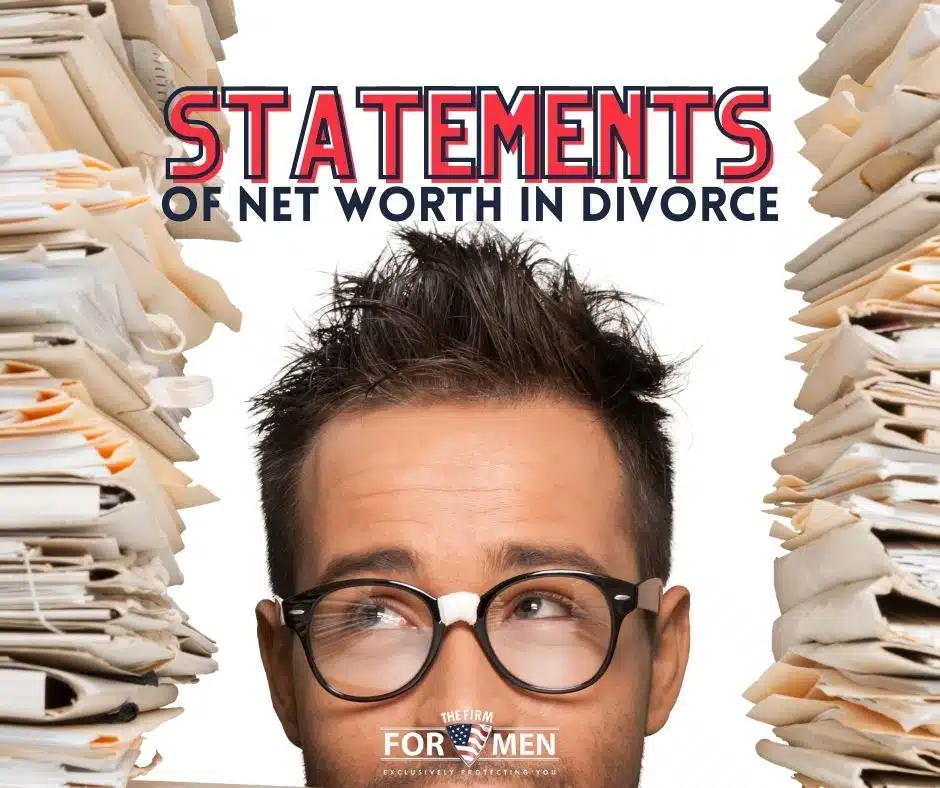We have all witnessed the tawdry spectacle of brutal, nasty, embarrassing Hollywood divorces like Charlie Sheen and Denise Richards, or Johnny Depp and Amber Heard. Yet even the most benign, quiet Virginia divorce can have its ugly moments. Rather than reveal any weird personal habits, both parties must provide financial disclosures.
Jump to a Section
- Financial Disclosures in Virginia Divorce
- Complete Financial Disclosures Honestly
- Monopoly & Marital Assets
- The Risk of Hiding Assets from a Virginia Judge
Financial Disclosures in Virginia Divorce
Under Virginia Code § 20-107.3, both parties must present a complete inventory of assets and liabilities for the court to “decree as to property and debts of the parties.”
So, we’re sorry to say, you do have to provide a statement of net worth in your divorce. The statement goes by several names:
- Financial disclosure
- Statement of Financial Condition
- Balance Sheet
- Statement of Financial Position
- Financial Affidavit
The title matters not at all; the complete and truthful contents matter significantly. If you choose to hide assets during discovery (the portion of the divorce proceeding when opposing parties share information), you can be charged with a crime.
Complete Financial Disclosures Honestly
Divorce is not a joke or a game. We get that. We work with desperate and distraught men every day. But in the game of life, the dice roll against you about as often as they roll in your favor. Simply because your marriage is over does not mean you have to sacrifice other parts of your personality.
Take honesty, for example. Continue to be an upstanding person; stay honest, stay noble. Provide a thorough accounting of your financial situation, holding nothing back from your attorney or the court.
Some men feel conflicted in divorce, determined to make the ex-spouse “pay” somehow for perceived slights or emotional scars. They may trade some of their finest personal qualities—honesty, dignity, compassion—just for the temporary satisfaction of “screwing over” or “getting back at” an ex.
That’s a bad strategy, in games and in life. Take the high road. Complete the financial disclosures honestly, leaving the strategy for minimizing your exposure to your accountant and attorney.
Monopoly & Marital Assets
You do not hold a monopoly on the assets of your marriage. In a Virginia divorce, all assets fall into three groups under the Code:
- Separate property—Tangible and intangible assets “acquired by either party before the marriage; (ii) all property acquired during the marriage by bequest, devise, descent, survivorship or gift from a source other than the other party; (iii) all property acquired during the marriage in exchange for or from the proceeds of sale of separate property, provided that such property acquired during the marriage is maintained as separate property”
- Marital property—Tangible and intangible assets “titled in the names of both parties, whether as joint tenants, tenants by the entirety or otherwise, except as provided by subdivision 3, (ii) that part of any property classified as marital pursuant to subdivision 3, or (iii) all other property acquired by each party during the marriage which is not separate property as defined above”
- Commingled or hybrid property—A difficult category in which separate property is used to acquire marital property (such as using an inheritance to buy a vacation home); in some cases, designations as separate property are retained while in other cases the hybrid property is designated as a marital asset
As you and your spouse worked your way around the marital board game, picking up properties, gaining windfalls and inheritances, or cashing in on intellectual properties, every financial event fell into one of those three categories.
It is your job to identify the events truthfully. Your attorney and accountant can suggest to the court what type of property resulted. The judge determines the final designations.
What properties must you identify? Everything. Every last nickel, every budding patent application, every unpublished novel you have tucked away in one of your homes:
- Income—every conceivable type of income, from salary, tips, bonuses and overtime to investment, partnership, and rental income
- Liquid assets—fungible funds such as all bank and investment accounts, cryptocurrency, precious metals, debts owed to you, and stocks and bonds you can sell immediately
- Illiquid assets—These are the clinkers in your portfolio, such as penny stocks, antiques, collectibles, futures contracts, intellectual property (that patent, that novel), some artwork, automobiles, and real estate (they’re all clinkers because they can take time to convert to cash or their sale results in a loss)
You and your spouse are also required to disclose all your debts and liabilities so the court can accurately determine your and your spouse’s net worth (assets minus liabilities).
The Risk of Hiding Assets from a Virginia Judge
Earlier, we mentioned the risk you take in hedging your bets on the financial disclosures. If you minimize evaluations, hide assets, or otherwise lie to the judge, you face:
- Loss of credibility in the eyes of the court
- Sanctions
- Fines
- Jail time for perjury
- Compulsory payment to your spouse of the full value of the hidden asset
- Loss of your attorney
That last item is significant; you endanger your attorney’s practice when you withhold information from your own lawyer. Your attorney will drop you as a client. You will have a difficult time finding another Virginia family law attorney willing to take you on, based on your track record.
Working with The Firm For Men gives Virginia’s men confidence that their interests are fully protected. Contact us online today, or telephone our Virginia Beach office at (757) 383-9184 to learn how we safeguard assets, work to secure future financial stability, and give you peace of mind during your divorce.

